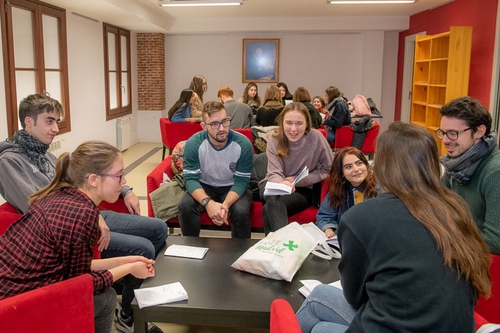Commented Bible Passages
February
On a Sabbath Jesus was teaching in one of the synagogues, and a woman was there who had been crippled by a spirit for eighteen years. She was bent over and could not straighten up at all. When Jesus saw her, he called her forward and said to her, “Woman, you are set free from your infirmity.” Then he put his hands on her, and immediately she straightened up and praised God. Indignant because Jesus had healed on the Sabbath, the synagogue ruler said to the people, “There are six days for work. So come and be healed on those days, not on the Sabbath.” The Lord answered him, “You hypocrites! Doesn’t each of you on the Sabbath untie his ox or donkey from the stall and lead it out to give it water? Then should not this woman, a daughter of Abraham, whom Satan has kept bound for eighteen long years, be set free on the Sabbath day from what bound her?” When he said this, all his opponents were humiliated, but the people were delighted with all the wonderful things he was doing. (Luke 13:10-17 NIV)
In the discussion that follows the healing of a crippled woman in the synagogue, Jesus ends by revealing the woman’s unique identity: she is a daughter of Abraham (v. 16). It is fitting that her true identity should be revealed on the Sabbath. With Jesus we are not on the level of “what we ought to do and not do”, as the leader of the synagogue argued (v. 14), but on the level of “who we ought to be or not be,” of who we truly are.
The leader of the synagogue referred to God’s commandment about the Sabbath in Exodus 20:9-11. Jesus, however, answers along the lines of the same commandment in Deuteronomy 5:13-15, which explains: “... so that you may rest, and remember that you were once a slave in Egypt, and that the Lord your God brought you out from there.” That is why the woman had to be “released” from her slavery precisely on the Sabbath. Thus she becomes a living sign, which recalls God’s deliverance today.
What does resting in God mean? First of all, it means to remember. It means seeing our life in another light than what we produce, seeing instead what God achieves, especially through our weakness. For the people of God it meant to remember their time of slavery. For us it can mean that the memory of our inner wounds will make us more human, that it will open us to see God’s goodness towards us and others and will help us (re)discover our true identity.
The crippled woman had to be “released”. From what do we need to be released, so that we may become who we truly are? Often we have to be released from doing “too much”. Instead of asking ourselves what more should we do, is not the question rather: how can we do less, so that we become free for what is more essential? The temptation can be to want to do more and more, because we are afraid that we never do enough, or we are afraid to say “no”, not wanting to disappoint anyone. Or else we want to do everything by ourselves, and not to entrust anything to other people. However, we are invited not to do more, but, like the crippled woman, to be more, to love more.
![]() What space can I find in my daily life to pause, to remember, to rest in God?
What space can I find in my daily life to pause, to remember, to rest in God?
![]() From what do I need to be “released”? Among all the activities I have, which ones should I let go of?
From what do I need to be “released”? Among all the activities I have, which ones should I let go of?
 TAIZÉ
TAIZÉ